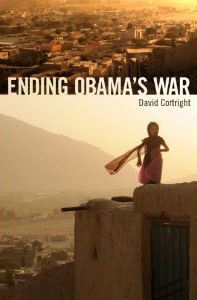
The death of Osama bin Laden has increased the calls for ending the war in Afghanistan. President Obama is scheduled to announce the start of military reductions in July, and many are urging a substantial troop draw down.
David Cortright’s new book “Ending Obama’s War: Responsible Military Withdrawal from Afghanistan” (Paradigm) outlines the rationale and strategy for ending the war in a way that enhances security and protects human rights.
“Military disengagement does not mean abandoning the Afghan people,” says Cortright, director of policy studies at Notre Dame’s Kroc Institute for International Peace Studies. “As the U.S. reduces its military footprint, we must maintain and increase support for civilian programs. Success depends not on the number of soldiers, but on better political leaders, more aid workers and many more educated Afghans, both men and women.”
The book includes a focus on the women of Afghanistan, who have achieved social, political, and economic advances since 2001. These gains are eroding, Cortright says, as violence intensifies. “The biggest threat to women’s rights is the pervasive insecurity,” he says. “The fighting has to end for women to preserve and expand their rights.”

“Ending Obama’s War” “makes a compelling case for a comprehensive calibrated strategy of military disengagement that offers the U.S. and its partners the most realistic chance of achieving their objectives in Afghanistan and the region,” says former U.S. Assistant Secretary of Defense Lawrence Korb.
The book presents “a balanced, well-documented critique of the war in Afghanistan combined with a thoughtful plan” for withdrawal, writes Lt. General (USA, Ret.) Robert G. Gard, Jr., Ph.D. It is “essential reading for those seeking a new way forward in Afghanistan," he says.
Cortright served in the U.S. Army during the Vietnam war before becoming a peace advocate, scholar and teacher. He is the author or editor of 16 other books, including “Peace: A History of Movements and Ideas.”
Contact: David Cortright, 631-574-8536, dcortrig@nd.edu